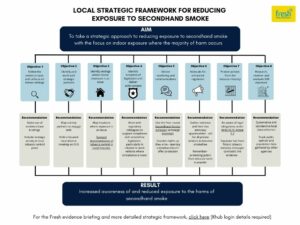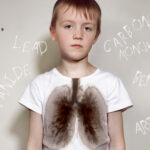Secondhand smoke is poison.
Fresh is committed to reducing indoor exposure to secondhand smoke (SHS) which causes serious health problems among children and adults.
Exposure to SHS is linked to worsening lung function and respiratory problems. It can trigger asthma attacks, reduce coronary blood flow, irritate eyes and cause headaches, coughs, sore throats, dizziness and nausea.
There is no safe level of exposure to tobacco smoke and there are long-term health effects, including heart disease and lung cancer, especially with continued exposure over time.

Our Smokefree Families campaign platform was supported by British Lung Foundation (now Asthma + Lung UK) to raise awareness of the risks of SHS and encourage smokers to take it outside.
While many smokers now take it outside, SHS is still a problem:
- A survey during 2020 found 53% of smokers smoked in the home when others are present – adult non-smokers present nearly half the time and children present 10% of the time (survey of Don’t Wait campaign of 413 NENC smokers, July 2020)
- The British Thoracic Society revealed that one in three children (32%) who end up in hospital with asthma had been exposed to cigarette smoke (2016)
Watch our Secondhand Smoke is Poison TV advert
A priority for Fresh is to raise awareness of the harms of indoor exposure and support partners to take a strategic approach to addressing second-hand smoke. We have an eight strand framework around reducing SHS.

Fresh’s role was pivotal in campaigning for the workplace and enclosed public places smokefree law introduced in 2007. We also supported the legislation on smoking in private vehicles carrying under 18s in 2015.
We advocate for measures to support partners with policies which encourage smokefree environments not covered by law, both indoors and outdoors, such as playgrounds. We believe the NHS also has a significant opportunity to promote smokefree environments to the many patients and their families and carers who are adversely effected each day from exposure to second-hand smoke.
A key priority now is social housing tenants given that smoking rates amongst this group are double the national average, with 1 in 3 people in social housing. See Smoking and Social Housing briefing from ASH.
